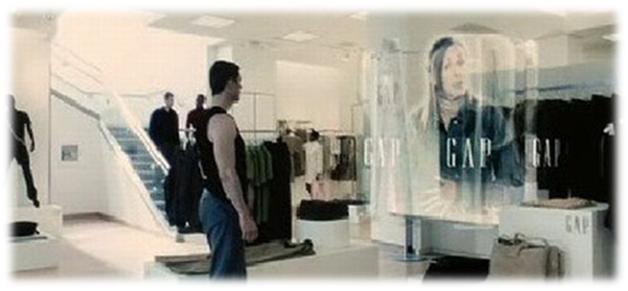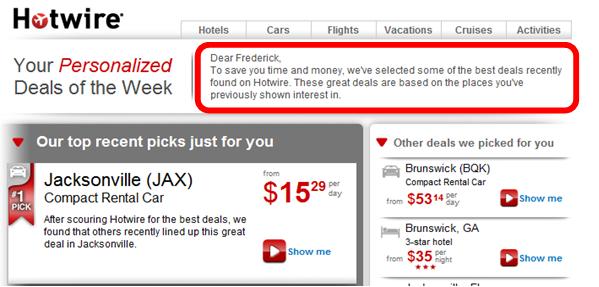OK, it wasn’t the greatest film of 2002, but Minority Report was a movie that had an indelible effect on me as a marketer and programmer. The setting is America in 2054, and Tom Cruise plays a troubled anti-crime cop. The screenplay is based on a book by the late writer and visionary, Philip K. Dick.
The plot, however, is secondary to an important scene that turned out to be highly predictive of how advertising has evolved in just the past few years. As Cruise wanders through a mall of the future, retailers perform iris scans on his eyes that personalize holographic sales pitches that are served to him as he moved from store to store. Based on past purchases and interests, he was inundated with come-ons from aggressive advertisers.
When I first saw the film, it was a very creepy moment when you considered that advertising and marketing might somehow evolve into serving up customized pitches based on your past behavior. But it seemed plausible that marketers would move from mass right down to the individual by knowing her traits, purchasing patterns, and now, search history.
So when I received two emails on the same day with a link to an article in paidContent from Jeff John Roberts, it reminded me of that chilling scene from Minority Report. The piece is called “Online Radio Will Start Serving Ads Based On Your Web Browsing,” and you can pretty much figure out the rest.
These emails were even more compelling because they each came from two of the brightest guys in the business – Entercom’s Tim Murphy and Saga’s Steve Goldstein – both of whom spend a lot of time thinking about where the puck is moving, and how to get there first.
Interestingly, their “takes” were a little different. Murphy saw it as a “big, important story for radio.” Goldstein wondered if this form of customized ad serving is “ever going to happen.”
Both asked good questions and raise important points. Clearly, Triton’s Mike Agovino is a fan. Personalized streaming ads based on Internet behavior provide radio with a tool in the arsenal it’s never had. Instead of the cume-centric, leap of faith traditional advertising that radio has always engaged in, these “smart ads” based on your surfing tendencies and web research history could make sense and provide radio will a whole new wrinkle.
Yet, as Goldstein points out, visiting Zappos to buy those New Balance shoes now guarantees a slew of Zappos ads wherever you go online the following week. I use Hotwire a great deal for personal travel. So when I rented a car in Jacksonville from them, I now get regular emails about hotels and cars in Jacksonville – even though I probably won’t be visiting there anytime soon. And when I bought school books for my daughter from my Amazon account a couple of years ago, I couldn’t stop the onrush of “recommendations” for other books I might enjoy about French literature or Asian anthropology. Ouch.
It also makes you wonder if other important variables aren’t being factored into the advertising process. First, there’s the quality of advertising that consumers hear. Maybe I’m researching hoodies and actually want to buy one, but whoever serves that next hoodies ad better work on the creative. With the exception of pioneers like Jerry Lee, radio seems to have lost its ability to produce creative, smart, compelling ads that make me want to fill my closet and impress my friends with the hottest hoodies available.
And what about the testimonial – especially from a trusted voice that matters? Yes, I know that most stations with viable personalities are selling “live reads.” But where’s the connection, the sincerity, the passion, and the credibility? If the station sells two or three of these an hour, are they really believable and effective? How could radio better utilize its biggest names to create true bonds and partnerships with select advertisers and local merchants that matter? How could sales reps provide better connections between the station, the personality, and the advertiser to move products and drive results?
As we know, recommendations are more important than metrics. And they’re also more important than seeing the fifth Geico ad this week while surfing – EVEN if I’ve done web research about car insurance.
All the technical wizardry the Internet brings to brands isn’t going to change the basic dynamic of the selling process. Are advertisers being served by local radio or treated like yet another dumb retailer? Do consumers who hear these messages feel moved to take action or are they being repelled by awful creative and 9-unit stopsets?
How can radio most effectively compete in a newly framed advertising environment that is driven by search and surfing?
How can new platforms be effectively monetized so that broadcasters are encouraged to use them?
How does technology change the basic ways in which products and services are marketed to consumers?
And where does a brand’s content factor into the equation, because without great programming, there is no audience.
We’ve got to answer these questions in order for radio to remain viable as an advertising medium. The future of the industry depends on it.
Iris scans, surfing history, and algorithms aren’t going to change the basics of how goods and services are sold and marketed.
 The legendary salesman, speaker, and author Zig Ziglar framed it this way:
The legendary salesman, speaker, and author Zig Ziglar framed it this way:
“Every sale has five basic obstacles: no need, no money, no hurry, no desire, no trust.”
It’s that final element where radio still has that fighting chance to succeed, and it’s an element that’s dependent on local sales management and their companies that train, coach, and inspire them. Radio isn’t losing opportunities because it’s missing out on new technology. It’s falling further behind because it forgot how to listen, how to serve, and how to solve problems.
- Why Small Businesses Matter…To Radio - February 20, 2025
- Will Consumers Ever Embrace AI? - February 19, 2025
- 2025 By The Numbers (So Far) - February 18, 2025






Most important sentence in the article:
“Radio isn’t losing opportunities because it’s missing out on new technology. It’s falling further behind because it forgot how to listen, how to serve, and how to solve problems”.
Thanks for the affirmation, Bob. There is a big difference between having accessibility to technology and having content attractive, compelling, and marketable enough to win. Appreciate you reading our blog.